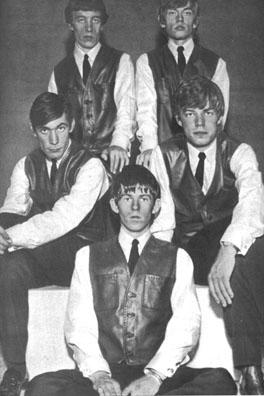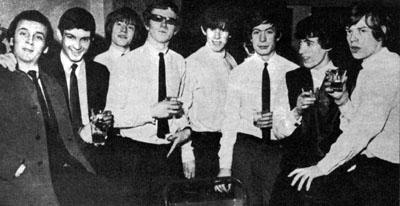 |
Mick Jagger: vocals
b. Michael Philip Jagger, 26 July 1943, Dartford |
Keith Richards: guitar
b. 18 December 1943, Dartford |
Brian Jones: harmonica and guitar
b. Lewis Brian Hopkins-Jones, 28 February 1942, Cheltenham, Gloucestershire;
d. 3 July 1969, London |
Bill Wyman: bass
b. William Perks, 24 October 1936 |
Charlie Watts: drums
b. 2 June 1941, Islington |
| |
| The
Rolling Stones are probably the most enduring group to emerge from
1960s British pop. They offer a remarkable contrast to their more
successful northern contemporaries, the Beatles: two members come from clearly middle-class backgrounds, skiffle played a very small part in their background, and they did not play in Hamburg with Tony Sheridan.
However, they did become the object of a marketing strategy specifically
designed to contrast them with John, Paul, George, and Ringo. (See
Charlesworth 1994.) |
| |
| 1949 [MJ 5-6; KR 5-6; BJ 6-7] |
| Living in the same town, Mike Jagger and Keith
Richards initially meet at Dartford Maypole
County Primary School, Kent (a SE London suburb). Brian
Hopkins-Jones is growing up in the resort town of Cheltenham where
father is an aeronautical engineer who plays the organ in church
and his mother is a piano teacher. |
| |
|
| 1958 [MJ and KR 14-15; BJ 15-16] |
| Brian Jones (16) is the first
in the band to make national news when a 14-year-old Cheltenham girl
becomes pregnant with his child. His school expels him and Jones begins
playing in trad bands. He will later move on to rock ‘n' roll bands. |
| |
| 1960 [MJ and KR 16-17; BJ 17-18] |
| Richards and Jagger meet
again after many years on a London train when the former notices the
blues albums tucked under his arm of the latter. Jagger is attending
London School of Economics. Richards is attending Sidcup Art School
from whence he will later be expelled (as he will also be from Dartford
Technical College). Together with Dick Taylor they begin performing
in Little Boy Blue and the Blue Boys. [Rolling Stones: Notes & Quotes] |
| |
| 1961 [MJ and KR 17-18; BJ 18-19] |
| Brian Jones goes to hear
Blues Incorporated in Cheltenham where he is playing sax in local group,
the Ramrods. |
| |
| 1962 [MJ and KR 18-19; BJ 19-20] |
| Richards, Jagger, and Taylor
read about Korner & Davies' club in Ealing (London). Jagger becomes
an occasional singer with Blues Incorporated. Richards & Jagger meet
Elmo Lewis (aka Brian Jones, after Elmore James) through Korner and hear
him and Paul Pond ("Jones" later of Manfred Mann) performing "Dust My
Blues." Pond returns to Oxford to study (and later to play with Manfred
Mann), and Jones looks for new partners. Ian Stewart (b.1938; d. 12 December
1985) becomes his pianist, with Jagger, Richards, Taylor and guitarist,
Geoff Bradford (who shortly after, leaves). They practice at the Bricklayer's
Arms in Soho. |
| 12 July: The "Rolling
Stones" debut at the Marquee with Mick Jagger (vocals), Keith Richards
(guitar), Elmo Lewis (guitar), Dick Taylor (bass), Ian Stewart (piano),
and Mick Avory (drums). Jagger: "I hope they don't think we're a rock
and roll outfit." Harold Pendleton (owner) and Cyril Davies apparently
think they are "a rock and roll outfit" and evict them from the Marquee. |
| December: Taylor quits
and the band replaces him with Bill Wyman who had played with the Cliftons
and had accompanied Dickie Pride for Larry Parnes. The Stones are
impressed by his amps. Avory leaves and they replace him with Tony Chapman
(also of the Cliftons), but he does not stay long with the starving group.
The Stones ask several drummers to join them, including Carlo Little from
Cyril Davies' Rhythm and Blues All Stars (and Screaming Lord Sutch). |
| |
| 1963 [MJ and KR 19-20; BJ 20-21] |
| 10 September. Loog-Oldham had caught a ride with Lennon
and McCartney after an awards ceremony. Taking them to a room above Ken
Colyer's club where the Stones were rehearsing. Lennon and McCartney had
finish off a song they had probably already been developing and teach
it to the suitably impressed Stones. The Stones record "I Wanna Be Your Man" in Kingsway Studios,
Holborn. |
| 29 September to 3 November. First
tour with Bo Diddley and the Everly Brothers. (Wyman, Jones and Watts
accompany Diddley on radio appearance.) |
| 1 November. "I Wanna
Be Your Man" / "Stoned" [Decca F 11764, UK #9] |
| Richards: " . . . you can
tell by the way the gigs are going there's something enormous coming.
You can feel this energy building up as you go around the country. You
find it winding tighter and tighter, until one day you get out there halfway
through the first number and the whole place is full of chicks screaming.
We'd walk into some of these places and it was like they had the Battle
of Crimea goin' on—people gasping, tits hanging out, chicks choking,
nurses running around." (Mark Greenfield. Keith Richards: The Rolling Stone Interview. 1971.) |
| |
| 1964 [MJ and KR 20-21; BJ 21-22] |
| 30 October to 15 November. Second US tour: Sacramento, Long Beach, San Diego, Cleveland, Providence, Milwaukee, Fort Wayne, Dayton, Louisville, and Chicago. |
| Jagger (to Ed Rudy, October 1964): "We find that the American
songs are better for ourselves. The songs that Keith and I write . . .
we give to other people. They're mostly ballads." (Mark Paytress, The Rolling Stones: Off the Record. London: Omnibus Press, 2009.) |
| 3 November. The Mayor
of Cleveland denounces the Stones as immoral and, after a 17-year-old
woman falls from a balcony, he bans future pop concerts. Oldham begins
to foster a bad-boy image, the opposite of the Beatles. |
| 13 November. "Little
Red Rooster" / "Off the Hook" released [Decca F 12014, UK #1] |
| 27 November. Mick
Jagger fined for traffic violations. |
| November. 12 x 5 [US LP, US #3] |
| December.
"Heart of Stone" / "What a Shame" [US release] |
| |
| 1965 [MJ and KR 21-22; BJ 22-23] |
 |
| 15 January. The
Rolling Stones No. 2 [LP UK #1] |
| 26 February.
"The Last Time" / "Play with Fire" released [Decca F 12104, UK #1] |
| 23 April to 29 May. Third American tour: Montreal, Ottawa, Toronto, London, Albany, Worcester, New York City, Philadelphia, Statesboro, Clearwater, Birmingham, Jacksonville, Chicago, San Francisco, San Bernadino, Long Beach, San Diego, San Jose, Fresno, Sacramento, New York City. |
| 5 June. "(I Can't Get No) Satisfaction"
/ "The Under Assistant West Coast Promotion Man" [London release, US #1] |
| 20 August. "(I
Can't Get No) Satisfaction" / "The Spider and the Fly" release
[Decca F 12220, UK #1] |
| 22 July. Jagger,
Jones, and Wyman fined for urinating against the wall of a service
station after being denied access to the washroom. |
| September. Out
of Our Heads [LP UK #2, US #1] |
| September.
"Get Off of My Cloud" / "I'm Free" [US #1] |
| October. "Get Off
of My Cloud"/ "The Singer Not the Song" [Decca F 12263, UK #1] |
| November. December's Children (and Everybody's) [US #4] |
| December.
"As Tears Go By" / "Gotta Get Away" [US #6] |
| |
| Stones
1965 |

